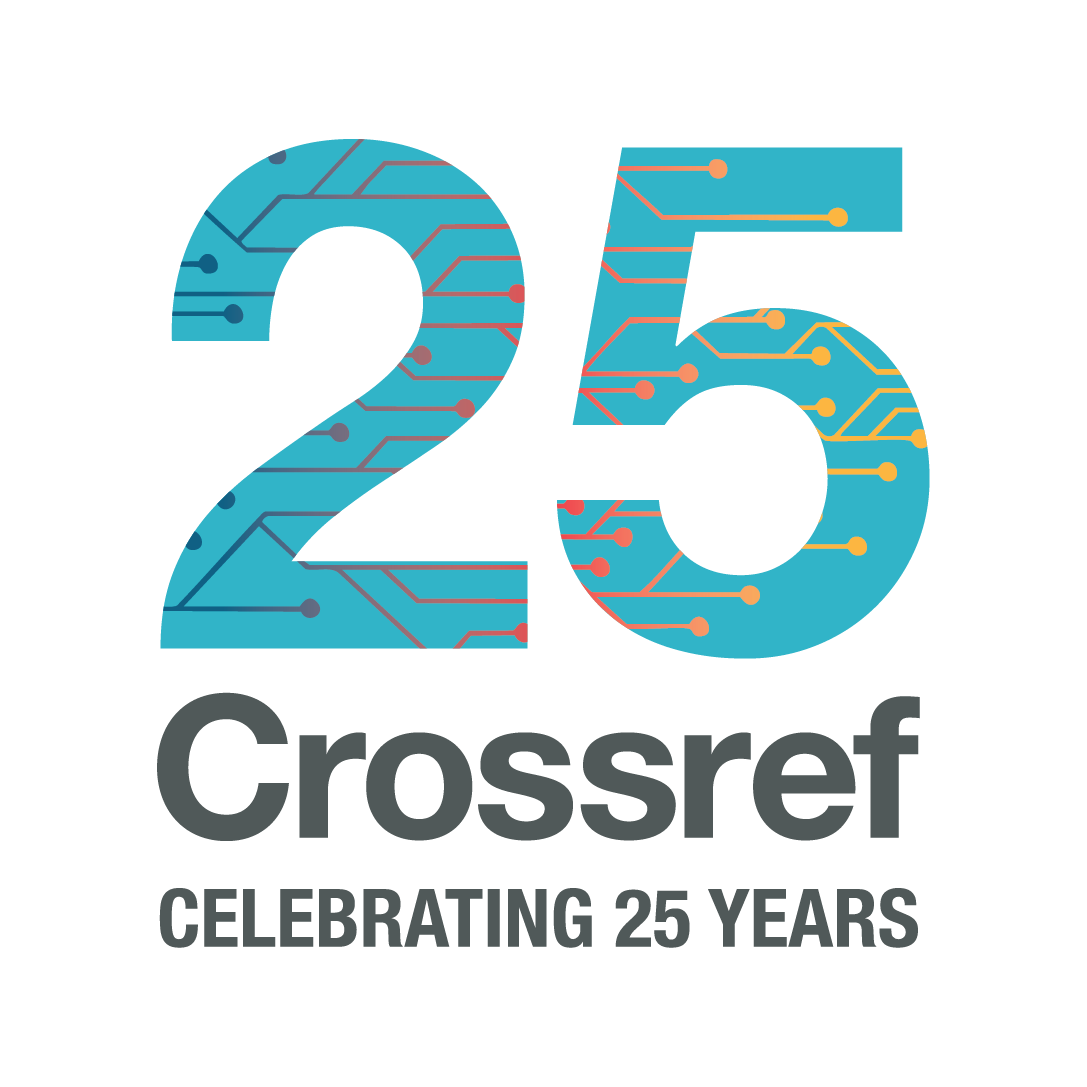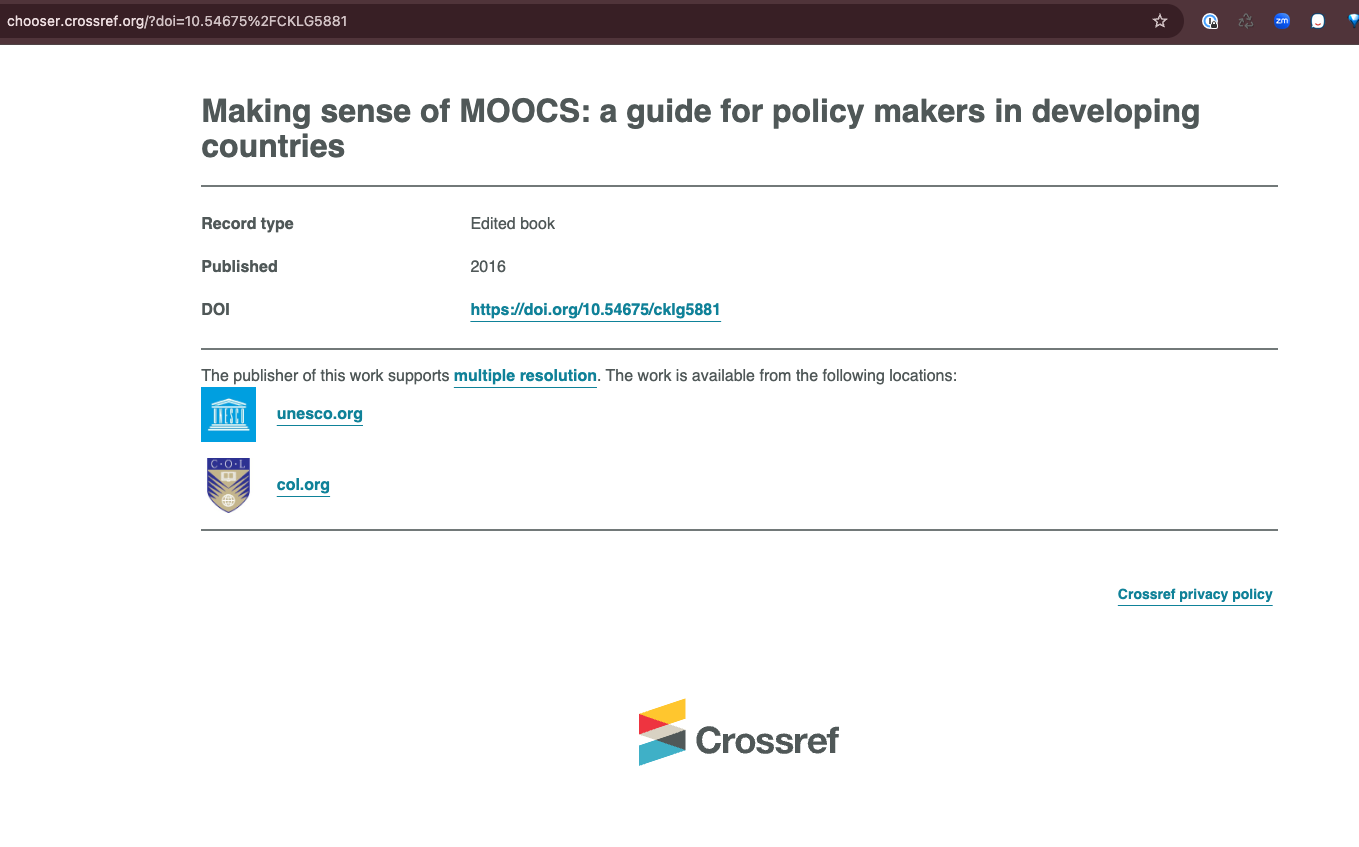6 minute read.Deprecating co-access: Crossref plans and timelines
To date, there are about 100 Crossref members who have made use of our co-access service for one or more of their books. The service was designed to be a last-resort measure when multiple parties - book publishers, aggregators, and other members - had rights to register book content. Unfortunately, the service allowed members to register multiple DOIs for shared books and book chapters, thereby violating our own core tenet of one DOI per content item. We should not have created a service that violated that tenet, resulting in duplicate DOIs. As we are able to offer an alternative in the form of the multiple resolution service, it is time to switch co-access off. Among other benefits – for the publisher and the authors, creation of a single DOI for each item, regardless of where it might be hosted, will result in more accurate citation counts and usage statistics. We’re retiring co-access at the end of 2026.
An idiom to start
There’s an idiom used in technology circles called ‘eating your own dog food.’ It’s used to describe an organization that tests or uses its own products in the real world. I’m no developer and only have a handful of years of exposure to this phrase, but I’ve always wanted to work it into one of my blog posts. The visceral reactions I have observed when it’s been used on internal calls are just too tempting. That, and I think it applies to our own rollout of and missteps with a service we call co-access. The decision to enable co-access reflected the priorities of that period, but we can now improve on it with an upgraded multiple resolution service. That rickety footing for co-access doomed it from the start. Now’s the time to face the music and swallow our own kibble.
Always meant as a last-resort measure, co-access allows multiple Crossref members to register metadata for shared book and book chapter content. Thus, use of co-access results in multiple, duplicate DOIs registered for the same book content. There are well over 500,000 DOIs in co-access within our corpus today. At least half of those are duplicates (more on this below).
This is far from ideal and has adverse consequences for the integrity of the scholarly record and the community. As we are able to offer an alternative in the form of the multiple resolution service, it is time to switch co-access off.
Among other benefits – for the publisher and the authors, creation of a single DOI for each item, regardless of where it might be hosted, will result in more accurate citation counts and usage statistics.
Duplicate DOIs
We frequently receive questions from members, metadata users, and others in the community, like this one, asking us what we are doing to combat the very real problem of registration and propagation of duplicate DOIs. We do take measures to prevent the registration of duplicate DOIs, including flagging registration of potential duplicate records to our members using what we call conflicts and conflict reports. As you might expect, this has been a sensitive topic for us, because we have one glaring service, yes, co-access, that has been actively exacerbating the issue of duplicate DOIs.
So, while we have been actively trying to counter the rise of duplicate DOIs, co-access enabled duplicate registrations of book DOIs. For every prefix that we configured for the service, we knew we were contributing to the problem (our members noticed too. As I said above, co-access allows multiple members to register their own DOI for shared book content. That means that book content in co-access has at least two DOIs registered. In some cases, there is book content with five or more registered DOIs for a single book. That’s a great many duplicates that this service is responsible for.
Replacing co-access
We plan to replace co-access with an existing tool, multiple resolution, which allows for more than one resolution URL to be registered to a single DOI. A user resolving the DOI is presented with an interim page, allowing them to choose from the various content sources registered with this DOI. We’ve made some progress toward making multiple resolution simpler for members to implement, but we still have more to do.
We’re aware that the technical steps involved in adopting multiple resolution might present a barrier to implementation for some of our members. To help with the transition, we are working on a basic tool (currently in beta) that simplifies the process. We will make it available to members between now and the middle of 2026.
Our timeline
We are not going to make these changes tomorrow. We’re going to give members who have been using co-access time to adjust. Right now, we trigger co-access when a secondary DOI is registered by a secondary registrant (member) that: 1) is already in a co-access group within our system with the DOI prefix that registered the original DOI, 2) has at least one shared ISBN with the metadata of that original DOI, and 3) has a title (in the title element of the book or chapter XML) that exactly matches the title of the original DOI. We’re going to stop triggering co-access for book and book chapter registrations starting 2026 July 1. No new DOIs will be placed in co-access starting then.
From there, there will be six months to clean up records already in co-access. One definitive DOI should be selected by the parties in a co-access group; the DOIs that will no longer be maintained for those books and book chapters should be aliased to the primary (definitive) DOI that will be maintained going forward. The primary DOI should be the DOI used on all landing pages for that book (or, book chapter).
In January 2027, if co-access DOIs have not been aliased to one another, we will force alias the DOIs in the record to the DOI registered by the organization identified as the publisher in the metadata records already in our system. At any point in this timeline, our team will be happy to help with the registration of secondary URLs in order to move books from co-access to multiple resolution. As a result, we will encourage members, end users, and the broader community to move back to using a single, definitive source of truth for these books and book chapters.
What will registration of books and book chapters look like post-co-access?
Coordinated. We expect that our members and their publishing partners will define the single DOI for each book and book chapter well upstream of Crossref, so all entities and their systems will use that one definitive DOI.
As for the registration process and our system, the first member to register the book (and its ISBNs) will establish the DOI for that book and its chapters. Following attempts to register the same content, with a duplicate book-level DOI(s), will fail the registration. Multiple DOIs for the same book or book chapter should be avoided starting 2026 July 01, as we will no longer be able to place books and book chapters into co-access.
We believe this will result in increased cited-by and usage metrics for that single DOI, and a cleaner, more accurate scholarly record.
We’d love to hear your reaction to this news in our Community Forum.







